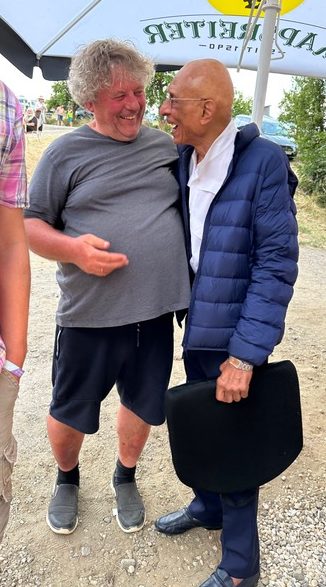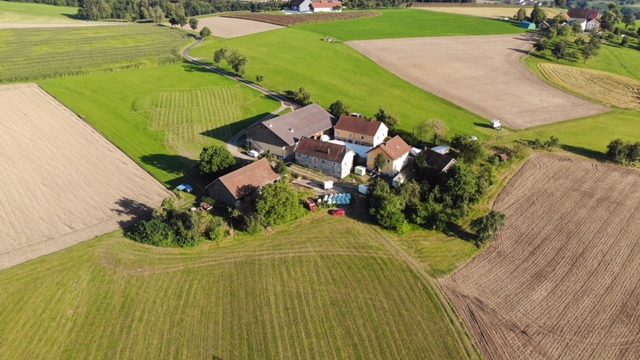Musik aus dem hohen Norden und tiefen Süden:
Die Inntöne gehen wieder auf Weltreise

Ein Festivalbericht von RJR-Mitglied Oliver Weindling
Inntöne proves Radio Jazz Research is not only about radio and jazz is totally wrong. And, with its Austrian ‘Ehrenmitglied’ Paul Zauner, it has a live music promoter here in his element. Carefully curating, being the genial host, on his own family farm.
Through his diligent research, we have a great idea of the cross section of quality jazz and improvised music which is around. Hardly as intimate as a club such as the Vortex, there is nevertheless a contact with musicians and indeed Zauner, who is often to be seen in the audience with a broad grin as he appreciates the music.
More than enough space for all, and an excellent choice of food and drink, the festival this year experimented and grew, using better its spaces such as the barn, where the festival used to be focussed before Covid.
While the music more than nods to its American roots, the selection of musicians had a strong European feel, as well as a great diversity.
There were a couple of ‘tributes’. First, more directly, a reworking of Mingus’s classic “The Black Saint and The Sinner Lady”, by saxophonist Clemens Salezny and Gregor Aufmesser, which allowed us to realise how a live performance of a classic can really add to our appreciation; and the other, more indirectly, David Helbock’s Austrian Syndicate, dedicated in name at least to Joe Zawinul, the Austrian keyboard trailblazer. Helbock is very much at the forefront of the band, relishing the opportunity to experiment, almost hyperactively, on his set of keyboards. Tempered by pianist Peter Madsen (equally a father figure of the Austrian scene especially in the west of Austria from where Helbock comes) and a trio of bass, percussion and drums. They balance the high energy and electricity which Helbock delivers.
The Austrian Syndicate was one of the daily energetic openers which would wake us up for the music ahead.
Similarly, we heard baritone saxophonist Helga Plankensteiner on Saturday with a tribute to the music – and outgoing personality – of Jelly Roll Morton. We were reminded of his other activities, such as gambler and pimp, as well as giving us a strong argument for his claim that he ‘invented’ jazz. A band which focussed on the lower registers, since in addition to Plankensteiner was bass clarinettist Achille Succi, sousaphone and drums.
Sunday’s opener was exciting as it was a chance to hear the first gig in a while of Tom Challenger’s Brass Mask. By slightly changing the lineup, apparently by force of circumstance as much as volition, he had an extra trumpet in Byron Wallen (who also doubled beautifully on conch shell) and used Caius Williams on electric bass (instead of tuba). It gave a good basis for new compositions, which were added to some of the band’s New Orleansy stalwarts.
Brass Mask was one of a particular feature on bands from London, of quite a variety. Xhosa Cole brought his quartet, and mesmerised with his Monk tunes in particular (where he brought on Byron Wallen and George Crowley as guests) but was highlighted by a solo version of Round Midnight.
There was also Freight Train, with Irish folk diva Cathy Jordan , egged on by Liam Noble and Paul Clarvis. Jordan is quite a blues shouter, and, behind her, Noble and Clarvis delivered their (dis)respectful takes on the music.
Zara MacFarlane took, I think, a couple of tunes to warm up. But by the end she had the audience in raptures with her jazz fused with soul, and her bubbly personality.
The other band from London was very different. Alexander Balanescu came with his string quartet. Perhaps best known nowadays for his arrangement of the University Challenge theme on TV, here he showed why this band had been at the forefront of the diversification of the string quartet repertoire. Especially effective was his violin rhapsodizing in the style of Romanian and Balkan folk musicians, reflecting his own roots in Romania.
Perhaps the closest to an ‘American’ quartet was that of saxophonist Hermon Mehari, born and brought up in Kansas. But the name of the group ‘Asmara’ gives away his Eritrean roots, which are subtly infused through the set.
There was a strong focus on woman performers in addition to those mentioned above. Pianist Johanna Summer played a solo set, building on her classical reinterpretations. Then there were three all-female bands. Two contrasting trios, with ECM saxophonist Mette Henriette, playing a minimalistic Nordic set with piano and cello, and the punkish, heavy groove of the high energy French band Nout (on which more in Alison Bentley’s review from Suedtirol). The repertoire could have felt unexpected with instrumentation of flute, harp and drums, as it grew from a quieter minimalistic start.
But also the all-star Scandinavian band of mesmerising percussionist Marilyn Mazur. Shamania gives a good indication of spirituality, here from a more northerly perspective, much of the music dating from the need to find new alternatives during lockdown. Balancing energy and giving a lot of freedom for musicians such as Danish saxophonist Lotte Anker, Norwegian trumpeter Hildegun Oiseth and Josefina Cronholm.
As much as the openers each day set us up, the closers on the main stage also balanced showmanship and technique. Brazilian accordionist Renato Borghetti, who played instruments of all sizes, was matched by the virtuosity of the rest of his band, reeds Pedro Figuereido, guitarist Daniel Sa and pianist Vitor Peixoto. And, finally on Sunday, Vieux Farka Toure built up the pace and volume steadily in a performance of desert blues, so that, by the end, we were all dancing as darkness fell.
But that wasn’t all, since the event also had us enjoying the history of jazz (in the farm’s barn) using some of the few US band leaders there, with Chanda Rule’s Sweet Emma band and veteran gospel/blues singer Janice Herrington and the jam in the pub (pigsty). By the way, on these we had a festival first, in that Paul Zauner broke one of his own rules of the festival, and joined in on trombone, only the second time in the 30+ years of the festival, he had blown his own instrument. Then on Sunday night the jam was graced with legendary 86-year old Kirk Lightsey, who had rushed over from London. Sounding like someone less than half his age, he played with an imagination that really placed him in the pantheon of Detroit great pianists which included Barry Harris and Tommy Flanagan. It boosted the rest of the band (led by Dmitry Baevsky on alto and Joe Manarelli on trumpet) who had already played well enough the night before with Oliver Kent on piano.

